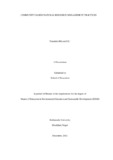
Please use this identifier to cite or link to this item:
https://hdl.handle.net/20.500.14301/227| Title: | COMMUNITY BASED NATURAL RESOURCE MANAGEMENT PRACTICES |
| Authors: | G.C, Narendra Bikram |
| Citation: | G.C, N.B.(2012).Community based natural resource management (CBNRM) practices. |
| Issue Date: | Dec-2012 |
| School: | SOED |
| Department: | DODE |
| Level: | Masters |
| Program: | KUMSD |
| Abstract: | When debates are visible on different political issues, people from rural communities are struggling for the equal access to natural resources. Meanwhile, this study highlights the existing practices of natural resources management at the community level. This study was carried out at Juphal Community of Dolpa District, in Mid Western Development Region of Nepal, focusing on exploring CBNRM practices, especially Non-Timber Forest Products (NTFPs) management, transmit of knowledge, skills and experiences, and contribution of Environment education at the community level. As a strategy of inquiry, it follows ethnographic study by applying interpretative paradigm under qualitative research method. The study explores the systems like compounding, fencing, plantation, thinning, pruning, singling and weeding, fire-line construction, khet and barilands irrigation turn-taking through limb (lottery) system, and appointing Herala-Nwarala1 , as ongoing practices. Even though, the communities are accustomed to such practices; 1 A community defined person with limited authority taking care of forest and farmland. ii they look for financial and technical supports especially the trainings and technologies from other institutions including government organizations. The community people have the knowledge that natural resources help their livelihood and they need to protect the natural resources. However, they do not transform their knowledge into practice. Therefore, there is a need to enrich their capacity, as gaps are there, on optimum utilization of resources to promote sustainable resource management. The study shows the local people need to build their capacity, so that they can transfer and preserve the knowledge, skills and experiences and environment education (EE) is one of the effective tools to widen the wise utilization of resources which can be furthered to achieve the sustainable use of resources practically. |
| URI: | https://hdl.handle.net/20.500.14301/227 |
| Appears in Collections: | Research Project |
Files in This Item:
| File | Description | Size | Format | |
|---|---|---|---|---|
| Narendra Bikram GC.pdf | 1.79 MB | Adobe PDF |  View/Open |
Items in DSpace are protected by copyright, with all rights reserved, unless otherwise indicated.